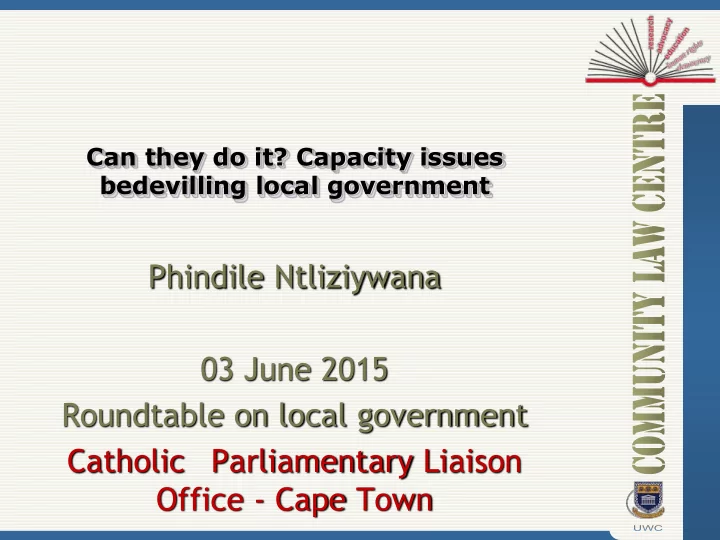

Can they do it? Capacity issues bedevilling local government Phindile Ntliziywana 03 June 2015 Roundtable on local government Catholic Parliamentary Liaison Office - Cape Town
Introduction Capability issues often hamper the success of devolution strategies The same holds true for SA Three interconnected reasons – case of South Africa local government experience: Ambivalence towards skill Devolution – not accompanied by capacity building measures Duplication (lack of coordination) NB: LG – not part of the public service 2
1. Ambivalence towards skills Context Modern skills - part of the ideological and technological apparatus of colonial domination Racial domination – skills & Job reservations Local government IMTA & ITC Profession of Town Clerks & Municipal Accountants Acts - 1988 Post apartheid state Associated “skill” with whiteness Mostly whites had high level of skills & expertise Abolished Profession of Town Clerks & Municipal Accountants Acts of 1988 Voluntary retrenchment packages 3 In order to give way to Black appointments
2. Devolution without capacity Local government given a const. status no longer a subservient arm original powers devolved No longer doing regular maintenance Wall-to-wall (no longer confined to urban nodes) Ever fewer but ever bigger (deracialised) reduced (1260, 843 then to 284) Currently we have 278 municipalities To be reduced further to 267 – 2016 (MDB) Thus: Became geographically much larger However, devolution coincided with “deskilling” Generic qualifications introduced South African Qualifications Authority Act – 1995 – South African Qualifications Authority Skills Development Act (1998) - SETAs 4
Generic qualifications failed Led to a litany of problems Adverse audit outcomes Service delivery protests/rates withholding Numerous interventions by provinces CoGTA’s back to basic document Top third – evidence of progress Middle third – mixed bag Bottom third – shows a system fraught with transformation related challenges 5
Government response Short-term interventions Project Viability Project Consolidate Siyenza Manje JIPSA Local Government Turnaround Strategy However, these had a minimal impact: Short-term Gap filling Hit-and-run 6
3. Duplication in capacity building measures 2006 - Performance Management Regulations – Systems Act Regulating outcomes (performance) 2007 - Competency Regulation – MFMA Regulating recruitment process - inputs (competence & qualifications) 2011 - Systems Amendment Act Regulates recruitment process- also focussing on inputs 2014 - Appointment Regulations – Systems Act 7
Further duplication Disciplinary Regulations - 2011 Procedures for dealing with allegations of misconduct against MM/Senior managers Financial Misconduct Regulations - 2014 Procedures for dealing with allegations of financial misconduct against senior managers and political office bearers Code of Conduct for Councillor Code of conduct for officials 8
Created ‘tripwires’ for LG Threaten the rule of law, and Violates s 155(7) – Constitution unconstitutional Threat to Rule of Law 1. Five prongs 1. Many ‘musts’ makes compliance impossible – Leading to compliance fatigue & – The resultant lawlessness 2. They come at a time when confidence in local government is at an all time low – Public already impatient with poor or lack of services 9
Dilemma 1 . Delays caused by complying with all the ‘musts’ - could lead to lawlessness 2. Similarly , ignoring the ‘musts’ to attend to the needs of the public – violates the rule of law. The approach taken by the Court in the Liebenberg judgment where it was said, at para 26: “a failure by a municipality to comply with relevant statutory provisions does not necessarily lead to the actions under scrutiny being rendered invalid. The question is whether there has been substantial compliance, taking into account the relevant statutory provisions in particular and the legislative scheme as a whole”. This approach should find application in HR decision- making as well. 10
Cont … 3. The complexity of the regulations poses a danger to the rule of law E.g: interpretation difficulties re: Non-compliant Appointment before 1 July 2007 Retrospective application? Non-compliant Appointment after 1 July 2007 but before 30 September 2015? Non-compliant Appointment after 30 September 2015 Legal uncertainty with respect to the actual legal situation after 30 September 2015 Assessment of extent of qualification 11
Cont … Legal uncertainty & confusion - Competency Regulations Leave officials exposed to political abuse Lindiwe Msengana-Ndlela Counter productive 4. The constant postponement of the deadline creates legal uncertainty Initial deadline – 31 December 2012 Shifted to – 1 July 2014 Now the new deadline – 30 September 2015 At this rate – local government is unlikely to take the deadline seriously, when it eventually comes 12 It does not offer legal certainty
Cont … 5 . Confusion on which regulations to apply Two parallel regulations – from two government department CoGTA & National Treasury Competence: Appointment Regulations & Competence Regulations Discipline: Disciplinary Regulations & financial Misconduct Regulations Regulating the same HR issues Officials will therefore be forced to cherry pick those rules that are less stringent Does not conduce to legal certainty and the rule of 13 law
“Who supervises what”? Who is responsible for local government Constitution give both CoGTA & Treasury a leading role Treasury is focused on the financial management side E.g : It confines itself to “financial officers”& supply chain management officers However, definition of “financial officer” – includes everyone. “ Official exercising financial management responsibility ” HR director in City of Cape Town manages a budget of about 6 billion It would help for the courts to clarify this question, once and for all 14
Violates s 151(4) - Constitution (3) “a municipality has the right to govern, on its own initiative, the local government affairs of it community” Subject to national legislation (4) “national … government may not compromise or impede a municipality’s ability or right to exercise its powers or preform its functions” The combined effects of this overregulation – violates this provision 15
Can they do it? At this rate They can’t Capacity issues need a coordinated effort Alignment needed in the flurry of laws Who said many laws are better than one? 16
Thank You pntliziywana@uwc.ac.za 17
Recommend
More recommend